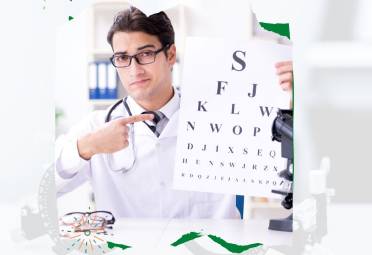Some Misconceptions About Your Eye Health From Eye Doctor
There are plenty of ideas and misconceptions about eyesight and keeping your eyes strong out there. At finest, they’re funny and harmless, like if you cross your eyes for an extended time they’ll settle that way. At the nastiest, they can be disturbing to your general health. The main problem is, for the reason that there are countless; it can be hard to be familiar with which are true and which is rumor. You should know first what’s false news and what’s valid and eventually how you can best take care of your eyes.
Just as in lots of facets of our health, there are misconceptions and myths about our eyesight health. Here are the five most common misconceptions about eye care explained by optometrist :

Misconception # 1: Reading in dim lighting can damage your eyesight:
You’ve maybe heard at some point in your life that reading in dim lighting can damage your eyesight. On the other hand, this isn’t essentially the case. As like as any other part of your body, your eyes grow weaker as you get elder, particularly when you hit your 30s. So, if you once were clever to read in the dark and currently find it complicated, it possibly has added to do with age and less to do with scratched eyesight. In any case, reading is for all-time excellent for your eye health, so don’t let this misconception keep you from your page-turner.
Misconception # 2: The sun does not injure your eyes:
Without appropriate protection, extended disclosure to the sun s ultraviolet (UV) rays and short-wavelength light (blue and violet light) can add to a diversity of eye conditions, counting cataracts (clouding in the lens of the eye) and macular deterioration. More than semi of all Americans of age 65 years or older have some proof of cataracts, the most common source of reversible vision loss between older people.
To defend your eyes from the sun, Best optometrist suggests wearing amber-colored lenses. The lens colors like amber, brown, and orange are more defensive. In addition, they are good for older adults for the reason that the amber family of colors enhances contrast. A dark sunglass lens cuts light and glare. An amber lens will cut glare but keep the light for you to observe.
Misconception # 3: As you age, eye exams ‘ are less important:
Eye exams are extremely significant for people age 65 and over. A regular eye exam each year is as imperative as a routine physical checkup. That way, if there is trouble, you can get it as untimely as possible. If you find in the early stage that you are suffering from glaucoma, then it is easily treatable. If you get fail to find it early, you could ultimately lose your vision. A checkup as well lets the doctor see macular erosion earlier than you are attentive to it.
Macular degeneration develops cells in the macula, the component of the eye that lets you see fine detail, to die. As a primary reason for vision loss in Americans age 65 and beyond, it can ultimately demolish your central, sharp vision.
Optometrist highlights routine, inclusive exams which comprise having your eyes widen. You require a complete eye exam to investigate problems wherever in the eye or in any other of the body. You can’t know if the visual system is in excellent shape except you open the eye and look at the whole picture.

Misconception # 4: There’s no way to avoid vision loss with age:
Possibly you’ve heard it’s expected that you’ll have to put on glasses when you get older. While it’s very ordinary for individuals to increase a need for medical lenses as they get old, it is likely to circumvent age-related vision loss.
According to an optometrist , You can begin protecting your eyesight when you’re younger by taking defensive steps like:
- Finding out what eye diseases you’re at a superior hazard for
- Having habitual eye exams
- Exercising regularly
- Eating a proportionate diet
- Inspecting for transformations in your eyesight
- Defending your eyes from UV rays
Misconception # 5: A nightlight can contribute to nearsightedness in children:
Have you ever speculated if your childhood nightlight contributed to your nearsightedness? Possibly you have children of your own, and you’re worried that putting a nightlight in their room possibly will cause a similar problem. While this idea roots from a preceding research study done in the 1990s, more fresh research from eye doctor has negated this common eye care misconception. It’s now supposed that placing a nightlight in a baby’s room might help in improving their eyesight, instructing them to focus on light and grow eye coordination from a young age.
In case of facing any issue related to eye sight healthcare, you can freely contact us to get professional assistance. Stay safe.
